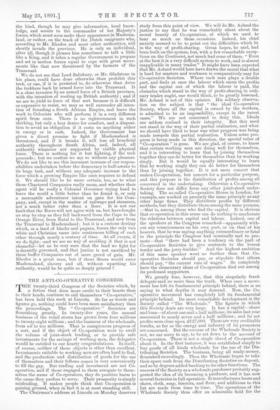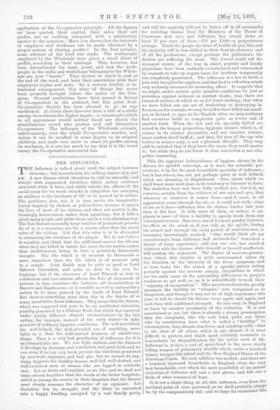THE ANTI-CO-OPERATIVE CONGRESS. T HE twenty-third Congress of the Societies which,
by a fiction that does more credit to their hearts than to their heads, continue to call themselves " Co-operative," has been held this week at Lincoln. So far as words and figures go, nothing could have been more satisfactory than the proceedings. The " Co-operative " Societies are flourishing greatly. In twenty-five years, the annual business of the retail stores has grown from four millions to twenty-eight millions ; and the business of the wholesale, from nil to ten millions. That is conspicuous progress of a sort, and if the object of Co-operation were to swell the volume of joint-stock trading, or to provide safe investments for the savings of working men, the delegates would be entitled to our hearty congratulations. In itself, of course, neither of these objects is other than excellent. Investments suitable to working men are often hard to find, and the production and distribution of goods for the use of themselves and their fellows comes in very conveniently to fill the gap. But trading and investment are not Co- operation, and if those engaged in them arrogate to them- selves the name of Co-operators, they do positive harm to the cause they profess to serve. Their prosperity is simply misleading. It makes people think that Co-operation is gaining ground, when in fact it is at most standing still. The Chairman's address at Lincoln on Monday deserves study from this point of view. We will do Mr. Acland the justice to say that he was remarkably silent about the moral beauty of Co-operation, of which we used to hear so much on these occasions. Indeed, his chief anxiety seemed to be to point out the difficulties which lie in the way of profit-sharing. Great hopes, he said, had been built on the system, but, with a few remarkable excep- tions on the Continent, not much had come of them. " Even at the best it is a very difficult system to work, and is almost inapplicable in many trades." It might have been expected that Mr. Acland would here have drawn the moral that what is hard for masters and workmen is comparatively easy for Co-operative Societies. Where each man plays a double part, and finds at once the labour which earns the profits and the capital out of which the labour is paid, the obstacles which stand in the way of profit-sharing in ordi- nary trades ought, one would think, to be greatly lessened. Mr. Acland is not of this opinion. His solitary observa- tion on the subject is that " the ideal Co-operative Society, where all the capital is owned by the workers, is admitted to be an impossibility, except in the rarest cases." We are not concerned to deny this. Ideals are seldom realised in their integrity. But this need not stand in the way of their partial realisation, and what we should have liked to hear was what progress was being made towards this partial realisation. Unless some pro- gress is being made in this direction, the special value of " Co-operation" is gone. We are glad, of course, to know that certain working men are doing well for themselves, and it is interesting to learn that by joining themselves together they can do better for themselves than by working singly. But it would be equally interesting to learn that by working singly they can do better for themselves than by joining together. It is not mere concert that makes Co-operation, but concert for a particular purpose, and this purpose is the distribution of profits among all concerned in the undertaking. Otherwise a Co-operative Society does not differ from any other joint-stock under- taking. The so-called Co-operative Stores in London, for example, are worked on precisely the same principle as any other large firms. They distribute profits by different methods, but they distribute them among the same persons, —that is, among those who find the capital. It is obvious that co-operation in this sense can do nothing to ameliorate the relations between capital and labour. Indeed, one of the speakers at the Congress remarked—apparently with- out any consciousness on his own part, or on that of his hearers, that he was saying anything extraordinary or fatal to the principle the Congress had nominally met to pro- mote—that "there had been a tendency on the part of Co-operative Societies to give contracts to the lowest tender and the jerry-builder." And the highest ambition of this same speaker went no further than that Co- operative Societies should pay, or stipulate that others should pay, " the current rate of wages." So completely have the elementary ideas of Co-operation died out among its professed supporters.
We greatly fear, however, that this singularly frank delegate said no more than the truth. When once a move- ment has left its fundamental principle behind, there is no saying to what depths it may descend. Now, the Co- operative movement has completely left its fundamental principle behind. Its most remarkable development is the Society called " The Wholesale." The figures in which this Society deals are very large. It has a capital—share and loan—of about one and a half millions; its sales last year amounted to nearly seven and a half millions ; and its net profits were close upon £127,000. These are very creditable results, so far as the energy and industry of its promoters are concerned. But the success of the Wholesale Society is not, we are sorry to say, to be set down to the account of Co-operation. There is not a single shred of Co-operation about it. In the first instance, it was established simply to buy goods of all kinds wholesale for the use of the Dis- tributing Societies. The business, being all ready-money, flourished exceedingly. Then the Wholesale began to take their spare cash from the Distributing Societies on deposit, and so by degrees added banking to its other functions. The success of the Society as a wholesale purchaser probably sug- gested the idea of its becoming a producer, and it has now several factories in full operation. It manufactures boots and shoes, cloth, soap, biscuits, and flour, and additions to this list are made from time to time. The operations of the Wholesale Society thus offer an admirable field for the
application of the Co-operative principle. All the figures we have quoted, their capital, their sales, their net profits, are as nothing compared with a satisfactory answer to the question : Have you shown that the interests of employer and workman can be made identical by a proper system of sharing profits i" In the first instance, some attempt of the kind was made. The workpeople employed by the Wholesale were given a small share of profits, according to their earnings. This, however, has been discontinued for some years, and now the work- people in the mills and workshops belonging to the Whole- sale are just "hands." They receive so much in cash at the end of the week, and here their association with their eniployers begins and ends. By a curious fatality or in- tentional arrangement, this state of things has never been properly brought before the notice of the Con- gross. General resolutions have been passed in favour of Co-operation in the abstract, but this great Anti- Co-operative Society has been allowed to go its way unchecked. At times there has even been a talk of a strike among its workmen for higher wages,—a catastrophe which to all appearance would neither shock nor startle the miscellaneous crowd who profess and call themselves Co-operators. The influence of the Wholesale extends, unfortunately, over the whole Co-operative market, and unless it can be recalled in some degree to its original platform, and made once more to share its profits among its workmen, it is not too much to say that it is the worst enemy the Co-operative movement has.



































 Previous page
Previous page